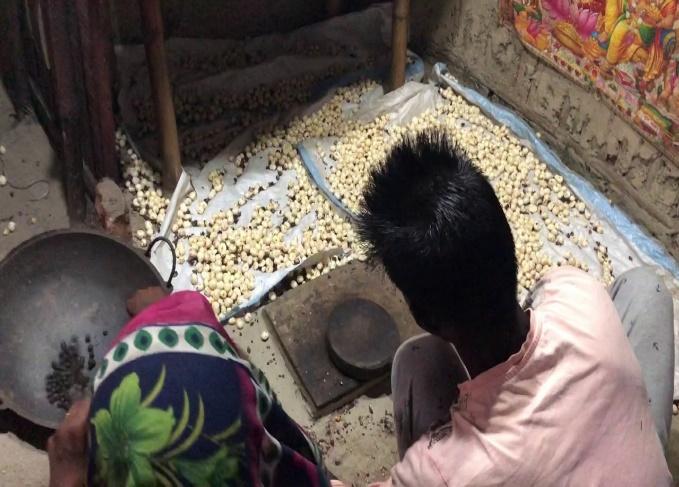Mechanizing Makhana Popping

India has traditionally been home to the new super food makhana or fox nut or Gorgon nut as it is called across countries. The makhana popping is a hard, tedious, labour intensive, time consuming and a cumbersome process.
What is Makhana Popping?
Makhana popping is the process of roasting lotus seeds and removing the shell to obtain the nutritious makhana. As per the state government data available, in Bihar alone, there are more than 5 lakh families directly working for makhana cultivation, harvesting, popping and selling the produce. The number of people involved is also on the rise to meet the ever-increasing demand of makhana in both domestic as well as the international markets.
Traditional Method of Makhana Popping
Makhana popping traditionally used to be a manual process, in which the lotus seeds are roasted in a traditional earthen pot, clay pot or in a cast iron pan. These pans are heated and the temperatures ranging from 250o C to 320o C. Thereafter, the makhana seeds are tempered for nearly 2 to 3 days. The next step is to roast the again and finally the seeds are popped manually using a wooden mallet.
Popping makhana is not an easy task, as malleting after roasting the seeds involves highly skilled workers. This is because time is of essence and even a delay of a few seconds in the malleting procedure can impact the quality of popped makhana.
Move to Mechanized Makhana Popping
The need for faster and less labour intensive methods of popping makhana seeds, along with the need to have quality makhana led to research on mechanizing the makhana popping process.
The mechanized popping of makhana includes threshing, cleaning, seed grading, drying, roasting and popping of makhana seeds. This method was developed, made scalable and finally commercialized by ICAR-Central Institute of Post-Harvest Engineering and Technology (CIPHET), Ludhiana, a city in the state of Punjab.
The mechanized popping process has been advantageous to the thousands of makhana farmers as it saved the poor fishermen from difficult conditions and also drastically improved their working conditions. In addition, mechanizing the process has enabled a systematic process for ensuring high quality makhana that if fit for both domestic consumption as well as the export markets.
New Makhana Popping Process
In the modern method of makhana popping, roasting the seeds is done in a closed barrel by making use of the electric heated thermic oil. It can be noted that other sources of heating at also be used as deemed fit, depending on the availability.
The roasting barrels are also thermally insulated , which further assists in saving the workers involved in the process from intensive heat. There is no need of malleting the seeds as the heated and roasted seeds automatically hit a closed casin within seconds for breaking the hard roasted seeds for popping.
The process is also beneficial in the sense that it eliminates all human intervention between the roasting and popping process. The modern way of popping lotus seeds helps in completely saving the operators from intensive heat and thus preventing burning of the hands. This advancement in the popping technology has acted as trouble shooter and also solved the long-standing problem of manual popping of the indigenous crop.
This process has also been beneficial in reducing the overall popping time from 2 to 3 days to only about up to 20 hours. Also, there is a significant improvement in quality and market value of Makhana produced by this method. Needless to say, that an improvement in the quality of makhana also fetches a better price in the market when compared to the traditional popping method.
Another benefit of mechanizing the process of makhana popping is that there has been a surge in the number of makhana manufacturers. While earlier, makhana cultivation and production was restricted to the eastern states of Bihar, and some north eastern states, but now it is being produced in other Indian states as well.
Indian states including Madhya Pradesh, Chhattisgarh, Telangana, Haryana, Uttar Pradesh, and Himachal Pradesh, are also making efforts to emulate the makhana success story and are gearing up for faster production and supply. There have been successful partnerships between the state governments and also the private sector players, who are collaborating to speed up makhana production to cater to rising demand and increasing avenues.
Last but not the least, Mechanizing makhana popping process has substantially increased the profit margin of the makhana farmers and producers. In some cases, the rise in profit margin is as steep as 300-400 percent which makes it lucrative for new entrants and players in this field. Government support in terms of subsidies, tax relaxation and providing technical know-how are also helping the makhana producers.
It can be easily concluded that while on one hand mechanization of the popping process has opened new doors and provided a boost to the makhana growers and producers. On another, it has also majorly improved the lives of the poor farmers and fishermen involved in the process. There has been a shift in the health of the farmers as they do away with the manual popping process. Also, there has been a rise in the income of the households involved in the makhana supply chain. Faster processing times and improvement in the makhana quality has helps them fetch better price and higher proft margins.